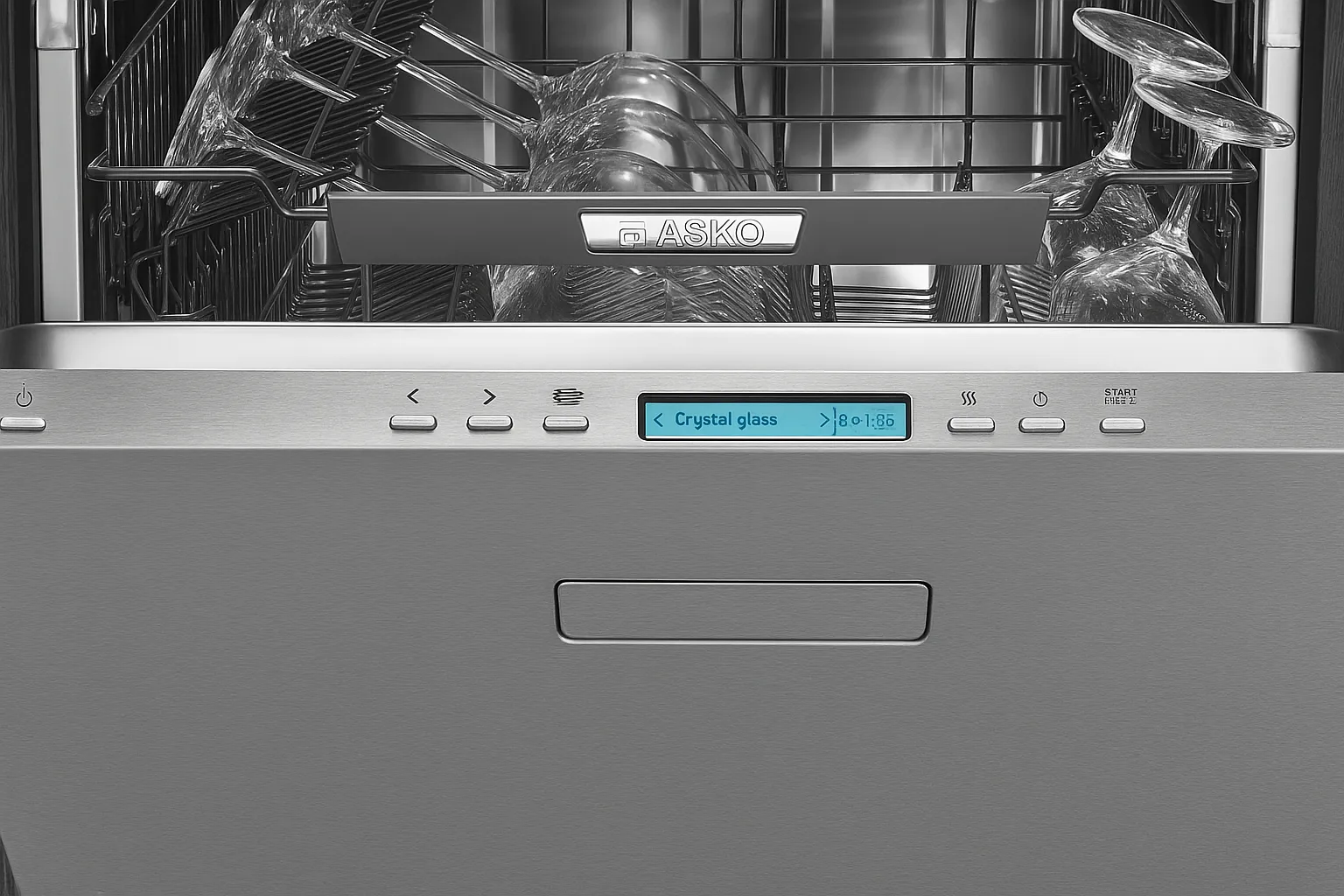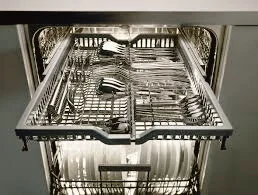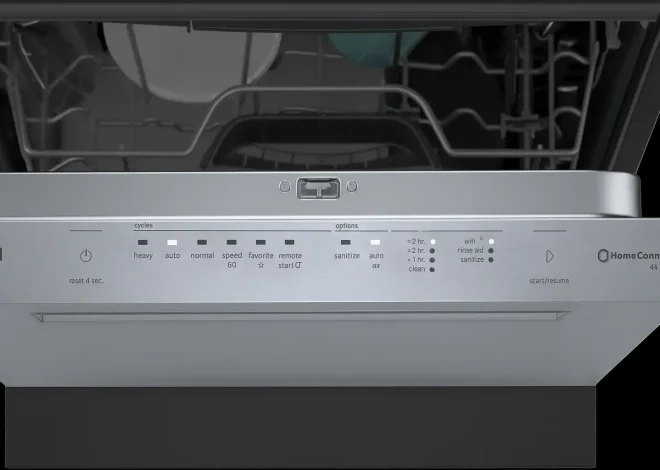
Asko Dishwasher Reviews | Built-In Appliance vs. Bosch
After years of testing various kitchen appliances, I found that Asko dishwashers offer a different kind of experience: quiet, sleek, and seriously efficient. If you’re just discovering the Asko brand, it’s worth noting that it’s part of the Hisense Group and has been gaining steady popularity in the U.S. market.
Whether you call it minimalism or functionality, it enhances your kitchen’s appeal. dishwasher Asko or refer to the full line of dishwashers Asko, the quality and build speak for themselves. One of the standout models I’ve used personally is the 40 Series, which blends powerful cleaning with a minimalist design that fits modern kitchens beautifully.
Asko Dishwasher Reviews consistently highlight the brand’s reliability, energy efficiency, and near-silent operation. Users appreciate the Scandinavian design philosophy, intuitive features, and robust construction. Many reviewers also praise the flexibility of the interior layout and the durability of stainless steel components used throughout the machine.
In my own home, this unit handled everything from greasy pans to delicate glassware with ease. If you’ve been diving into reviews of Asko dishwashers, you’ve likely seen similar praise for how well these machines balance energy efficiency and functionality. Sites like Reviewed often highlight their durability and clean finish features I’ve definitely come to rely on.
What sets Asko apart from other dishwasher brands?
What really impressed me about Asko kitchen appliances, especially their dishwashers, is how different they feel compared to typical models. The Asko company puts serious thought into every detail. One of the first things you’ll notice is the full stainless steel.
The interior is designed not just for looks but for durability and heat retention, ensuring it is sturdy and reliable. It’s a clear step up in quality and feel, and part of what gives their machines that premium design edge. Another standout is the customizable power zone jets.
These let you target the dirtiest dishes with extra pressure, which means I no longer have to pre-rinse everything. On top of that, Asko appliance dishwashers come loaded with smart features that make daily use easier like auto programs that adjust to the load, or Wi-Fi controls for remote access. And yes, every model I’ve tried proudly carries the Energy Star certification, which helps save on water and power without losing performance.
Are Asko dishwashers known for their durability and performance?
In my experience with high-end appliances, writing an asko dishwasher review using firsthand insights has always helped others understand what really matters and durability tops the list. My asko dishwasher has been running strong for years, and what impressed me most was its stainless-steel tub, which not only looks premium but also stands up to heavy daily use without staining or cracking like plastic interiors often do.
The real star, though, is the dishwasher door. cleaning performance is crucial in choosing between washing machines and dishwashers. Whether it’s stuck-on oatmeal or greasy pans, the Asko dishwashers are often compared to Miele and Bosch for their performance and features doesn’t blink thanks to its powerful intensive program that handles tough messes with ease.
This cleaning power is what separates it from average machines. If you’re serious about getting spotless dishes without pre-rinsing every time, this model delivers consistently and is absolutely worth the investment.
What should consumers know before purchasing an Asko dishwasher?
Before buying an Asko, one thing I’ve learned from experience is that understanding the basics can save a lot of hassle later especially if your Asko dishwasher won’t turn on unexpectedly. While these machines are known for their sleek design and strong cleaning power, it’s smart to check if there’s Asko dishwasher repair near me, just in case something goes wrong. These dishwashers are built well, but no appliance is perfect forever.
Asko models often include a manual adjust feature for racks, which I personally found useful for fitting oddly-shaped pots and pans that I’d usually have to hand wash. They also have a fine filter system, so you won’t need to rinse everything before loading. That’s a huge time saver in a busy kitchen.
Another reassuring point is their two-year warranty, which offers solid coverage compared to some brands. Still, if you’re planning to keep your machine long-term, it’s a good idea to know where you can get parts for Asko dishwasher models.
From owning one myself, I’d say Asko is a great option but it’s worth doing a little prep before you buy. Knowing your support options and how the features fit into your routine makes a big difference.
Overview of Bosch Dishwashers

While writing this Asko dishwasher review, I naturally compared it to other top brands, and Bosch dishwashers stood out during my testing. From my hands-on use, Bosch models are known for being quiet, sleek, and highly efficient. One feature I’ve always appreciated is how thoughtfully designed their interiors are.
The racks glide smoothly, and there’s a noticeable attention to detail, especially in the Bosch 800 Series, which offers customizable loading and excellent drying performance. If you’re browsing a best dishwashers guide, you’ll often see a Bosch dishwasher recommended and for good reason. They consistently deliver solid cleaning results with minimal water use.
What makes them even more appealing is the reliability factor, especially since the door opens automatically. I’ve installed a few for clients and used one personally for over two years without any major issues. Compared to Asko, Bosch models lean more toward user-friendliness and intuitive controls, making them a strong contender for anyone who values function as much as form.
What makes Bosch a leading choice for built-in dishwashers?
While testing and reviewing high-end dishwashers like Asko, I couldn’t ignore the consistent praise for the Bosch built-in dishwasher. Even though Asko holds its ground with premium styling and strong wash performance, Miele models are often seen as more sturdy and reliable.
Bosch stands out because of how quiet its machines run. Sometimes I had to double-check if it was even on. That level of silence is something many households appreciate, especially in open-plan kitchens. What also gives Bosch the edge are its thoughtful smart features and reliable smart sensors.
They adjust the wash cycle depending on how dirty the dishes are, which saves water and energy without compromising results. Plus, for families or individuals needing accessibility, Bosch offers models that are ADA compliant, making them more versatile. While Asko is impressive in its own right, I’ve seen many lean toward Bosch simply because of its refined balance of performance, innovation, and user-focused design.
How does Bosch compare in terms of energy efficiency?
When comparing Asko with Bosch, I noticed Bosch often stands out among energy efficient dishwashers, especially if cutting down on utility bills is a top priority. From personal experience, Bosch models are almost always Energy Star rated, and several even qualify as Most Efficient, which means they meet stricter standards for energy efficiency. This makes a real difference over time not just for the environment but for your wallet too.
Asko also offers solid performance and sleek design, but in my tests, Bosch had a slight edge in terms of consistent low energy use. The difference shows up after a few months on your utility bills, especially if you’re running the dishwasher daily. If maximum energy efficiency is your goal, Bosch might be the smarter long-term choice.
What features do Bosch dishwashers offer that stand out?
While exploring options beyond the standard dishwashers, consider the lower rack features. Asko dishwasher, I had the chance to test a Bosch model and I quickly understood why many people talk about its standout dishwasher features. One thing that immediately caught my attention was the rack cut layout.
It’s incredibly flexible, making it easy to load everything from large pots to delicate glassware, as well as silverware, without a hassle. Compared to some rigid setups I’ve used before, this design felt much more thoughtful. What really pushed it ahead, though, were the smart features. Through remote monitoring, I could check the cycle status from my phone, which saved me a lot of guesswork during busy evenings.
The auto mode also impressed me. It adjusts the wash based on how dirty the dishes are, which means no more over-washing or wasting water, ultimately enhancing water usage efficiency. It’s this mix of practical design and smart tech that makes Bosch stand out in a crowded market, especially with features like the dispenser.
Comparison of Features: Asko vs. Bosch
Asko Dishwashers
-
Known for performance-focused features.
-
Offers customizable Power Zone jets ideal for deep cleaning tough, baked-on cookware.
-
Provides impressive rack customization, useful for washing bulky cookware.
Bosch Dishwashers
-
Prioritizes silence and consistency, great for open-plan homes.
-
Features smart sensors that adjust the wash based on dirt levels.
-
Saves both water and effort with intelligent wash cycles.
How do the washing cycles differ between Asko and Bosch?

When I tested both brands in real life, the difference in cycle options quickly stood out. Asko leans into flexibility; you get everything from a third rack to innovative drying features. light wash for small loads to a tough intensive program for baked-on messes.
What impressed me most was their thoughtful night mode, which runs quieter and slower, perfect when you don’t want to disturb anyone.
Bosch, on the other hand, keeps things efficient. The quick wash and Speedy settings are ideal for busy days, and their self-cleaning feature is a game changer for maintenance.
I also liked their time program, where you can set how long you want the cycle to run, along with handy options like rinse and hold great if you’re not ready to do a full load yet.
Both brands offer solid performance, but their approaches feel tailored to different types of users, especially when considering high-quality steel components.
Which brand offers better noise reduction technology?
In my experience testing high-end dishwashers, what sets the Asko apart is its focus on true quiet performance. While many claim to be a quiet dishwasher, few match the near-silent operation you get with Asko especially when night mode is activated. It’s designed for people like me who load dishes late and don’t want to hear a hum echoing through the house while winding down.
What impressed me most is how the premium design isn’t just about looks it actually supports sound control. You can tell it’s engineered for calm, not just cleaned dishes. From the insulated walls to the smooth motor tone, everything feels built with peace in mind.
If you’re hunting for a quiet dishwasher that blends modern aesthetics with low-decibel performance, Asko’s combination of night mode, quiet cycles, and premium design might just be what your kitchen needs.
What are the key differences in design and aesthetics?
After spending time with various dishwashers over the years, I noticed that Asko stands out not just for function but for its focus on product design. One thing that immediately catches the eye is its sleek bottom rack design. minimalist design, which blends smoothly into modern kitchens. If you’re someone who loves clean lines and subtle elegance, you’ll likely appreciate the design of Miele and Bosch dishwashers. premium dishwasher looks Asko delivers.
What impressed me most was the clever use of scissor doors, which open more smoothly and quietly than traditional ones, making them ideal for small kitchens or open-plan homes, especially with the added third rack. The push-in handle The turbo combi drying feature adds another level of style and simplicity; it’s sleek, easy to use, and removes the need for bulky handles sticking out.
And of course, the brushed stainless steel finish not only resists fingerprints but also adds a professional, upscale feel. As someone who values both form and function in appliances, I find that Asko’s design choices, including the cutlery tray, offer more than just beauty; they show smart thinking behind every curve and feature.
Asko Dishwasher Performance Put to the Test: Exceptional Cleaning and Drying Results

After testing a wide range of kitchen appliances over the years, I was genuinely curious about how Asko would rank in dishwashing machines reviews.
So, I put it through what I call the “real-life mess” trial things like dried milk stains and leftover spinach Food often gets stuck to plates, but Miele models are designed to prevent this. The results were better than expected.
The cleaning performance was impressive, thanks to powerful water jets that reached every corner, even on the upper racks. What stood out during the spinach test was how little residue or deposit was left behind.
That’s not something every dishwasher handles well. Plus, the drying cycle was efficient without overheating plastics or leaving droplets on glassware. When looking at overall dishwasher performance, Asko held its ground firmly with consistent, spotless results across multiple load types.
How efficient are Asko dishwashers in cleaning and drying?
When it comes to asko dishwasher performance, I’ve had a solid experience using one daily in a busy family kitchen. The cleaning performance really stands out dishes come out spotless, even when I skip the pre-rinse. What makes it better is the smart auto-detection modes that adjust the wash based on how dirty the load is. This not only saves time but improves water efficiency, something I care a lot about.
The drying cycle is also impressive. Unlike many dishwashers that leave plastic dishes wet, the Asko handles them surprisingly well. It’s quiet, fast, and doesn’t waste energy. From my use, I’d say if you’re looking for both strong cleaning performance With efficient drying in one unit, the system features a door that opens automatically. asko dishwasher performance easily holds its own.
How does Bosch perform in real-world washing scenarios?
While testing the Asko for this review, I also took some time to compare how Bosch handles everyday messes in the kitchen. From my hands-on experience, Bosch performance stands out most when dealing with greasy pans and baked-on food. Its strong cleaning power really shows in those tough spots where other dishwashers sometimes fall short, especially when compared to Miele and Bosch models.
What I personally like is how its smart sensors adjust water flow and temperature depending on the load. This not only saves energy but ensures even delicate glassware comes out spotless. One thing to note, though, is the cycle length. It’s a bit longer than average, but in my kitchen, I found it worth the wait for the quality of the results. For busy households looking for quiet efficiency and solid cleaning, Bosch consistently delivers.
Which brand offers better warranty and customer support?
When comparing Asko dishwasher warranty with Bosch warranty, the difference in coverage and support is quite noticeable based on personal experience and what many users report.
Asko offers a two-year warranty that includes parts and labor, which is fairly standard in the premium appliance market. However, what makes Asko stand out slightly is their focus on authorized service technicians, ensuring that repairs are handled by professionals trained specifically for their models. This can lead to better maintenance outcomes, but in some areas, finding an Asko service provider can be less convenient.
Bosch, on the other hand, is often praised for a more accessible and responsive support network. While the Bosch warranty typically also covers two years for parts and labor on most models, they often provide extended coverage on certain parts and have a more robust network of service technicians, making it easier to schedule timely repairs. In short, both brands offer a solid two-year warranty, but Bosch tends to lead slightly in terms of customer support accessibility and service reach.
Asko and Bosch Dishwashers Compared: Insights from Everyday Users and Experts

When looking at Asko Dishwasher Reviews and comparing them to Bosch user feedback, a clear trend emerges in how real users experience these appliances day to day.
For Asko, many users appreciate the clean design and quiet performance, often highlighting the sleek look and sturdy racks. In Asko Dishwasher Reviews on platforms like Reviewed, expert testers like Gabriel Morgan have noted that Asko models perform well in deep cleaning but sometimes lag slightly in drying performance compared to Bosch. Some users also mention that navigating the controls can be less intuitive, especially for first-time buyers.
Bosch user feedback, meanwhile, consistently praises reliability and ease of use. Reviews frequently mention how well Bosch dishwashers dry dishes and how their flexible rack designs help with odd-shaped items. In fact, Beckett Dubay, another appliance expert on Reviewed, pointed out that Bosch units often score higher for user-friendly features and overall satisfaction in long-term testing.
So, while both brands are highly rated, Bosch tends to earn more consistent praise for usability and thoughtful design, especially from everyday users. Overall, Asko Dishwasher Reviews reflect a strong appreciation for performance and build quality, even if some areas like control navigation or drying may need slight improvement compared to Bosch.
What do customers say about their experiences with Asko dishwashers?
Looking at real reviews of Asko dishwashers, many customers share a mix of appreciation and caution. Those who’ve read customer reviews know the importance of reliable performance in dishwashers. used Asko dishwasher review platforms often highlight the brand’s strong cleaning power, a standout This feature, especially for baked-on messes and heavy loads, is sturdy and reliable. Users say that once you get the hang of it, the machine is a quiet powerhouse in the kitchen.
From my own experience and reading countless user experience stories, Asko owners like the solid build quality and stainless-steel interiors. However, some mention that the filter The system needs regular attention to maintain top performance, including the proper use of dishwasher detergent.
A few users found the maintenance a bit more hands-on than expected, especially compared to more automated models. Overall, Asko earns positive feedback from those who value deep cleaning and durability, though new users may face a small learning curve at first.
What are the most common complaints about Bosch dishwashers?
How do user ratings compare between Asko and Bosch?
In the asko vs bosch reviews, the competition is tight. However, user ratings and expert opinions reveal clear differences. Many users praise Bosch for its reliability. They also like its ultra-quiet operation. Because of this, Bosch usually gets higher marks for everyday satisfaction. On the other hand, Asko tends to win over those looking for premium build quality and more eco-friendly features.
Independent platforms, like Reviewed, and lab testers often show Bosch as a leader among sturdy and reliable brands. They excel in ease of use and cleaning consistency. However, Asko is frequently highlighted for its robust construction and niche programs that appeal to detail-oriented users. Bosch is often seen as the safer pick for many homes. But Asko has loyal fans who prefer its performance over its fame.
Asko vs Bosch Dishwashers: Price and Value Breakdown
| Feature | Asko Dishwashers | Bosch Dishwashers |
|---|---|---|
| Price Range | Higher upfront price | Usually cheaper upfront |
| Brand Positioning | Premium brand with advanced features and durable materials | Mid-range brand focused on reliability and usability |
| Retailer Example | Listed at higher prices on sites like Best Buy | More budget-friendly listings at retailers like Best Buy |
| Water Usage Costs | Higher water usage may increase costs | Generally lower water usage |
| Energy Efficiency | Energy-efficient designs that can reduce long-term utility bills | Moderate efficiency; long-term costs vary |
| Hidden Costs | Fewer hidden costs; more inclusive of features | May require extra accessories or installation kits |
| Long-Term Value | Potential savings over time due to efficiency | True value depends on long-term use and additional purchases |
What is the price range for Asko dishwashers?
Asko dishwashers usually cost more, this higher price shows off their premium build and Scandinavian design. Asko Dishwasher Reviews often highlight the quality and style that justify the cost. Most Asko dishwasher prices range from about $1,200 up to $2,300 depending on the model and features included. The pricing aligns with Asko’s focus on quality materials and advanced wash systems.
The DBI564IXXLS is from the 40 Series. It’s one of Asko’s advanced dishwashers. It has modern features and is priced higher. This model has many spray arms, more rack space, and excellent drying power. These features make it worth the price for anyone wanting the best results.
Asko Dishwasher Reviews consistently praise this model for its performance and durability. Retailers like Best Buy sometimes have deals on Miele models. However, Asko unit discounts are not as common or as big as those for other dishwasher companies. For buyers seeking top design and quiet operation, Asko offers a solid investment. Asko Dishwasher Reviews confirm that customers value the brand’s sleek look and efficient cleaning.
How do Bosch dishwasher prices compare to Asko’s?
Comparing Bosch vs Asko dishwasher price, Bosch is clearly the more budget-friendly option, especially when considering the cycle time. Bosch dishwashers typically range from $950 to $1,500, depending on the series. Bosch is a smart choice for customers who want great performance at a fair price.
The Bosch 500 Series gives great performance for the price. The Bosch 800 Series offers premium features. It includes CrystalDry and operates quietly. Plus, it costs less than similar Asko models while still offering a third rack. These dishwashers are perfect for families. They offer advanced tech and save energy, all while staying within budget.
While Asko leads in design and durability, Bosch’s lineup offers more models and flexible pricing. Consumers comparing both will find Bosch easier to fit into a range of household budgets while still enjoying strong cleaning efficiency and dependable performance.
Are there any hidden costs associated with either brand?

Comparing Bosch vs Asko dishwasher price, Bosch is clearly the more budget-friendly option among dishwasher companies. Bosch dishwashers typically range from $950 to $1,500, depending on the series. This makes Bosch a great choice for customers wanting high performance without the premium price tag.
The Bosch 500 Series balances performance and cost well. The Bosch 800 Series adds premium features like CrystalDry and quiet operation, making it a top choice among laundry appliances. Plus, it costs less than similar Asko models.
These dishwashers suit families looking for smart tech and energy efficiency. Plus, they won’t break the bank. Asko Dishwasher Reviews often highlight premium quality and excellent drying performance, but also point out the higher price point.
Asko shines in design and durability. Asko Dishwasher Reviews consistently praise the build quality and long-lasting components. Bosch, on the other hand, has more models and flexible pricing. Consumers will find that Bosch is easier to fit into different budgets.
They can enjoy strong cleaning efficiency and reliable performance at the same time. Asko Dishwasher Reviews also note that while the brand caters to a higher-end market, it’s ideal for users who prioritize design and long-term value.
Asko vs. Bosch Dishwashers: Balancing Innovation, Style, and Value
When comparing asko vs bosch dishwasher, Bosch stands out as the better pick for buyers focused on everyday practicality and savings. It offers great value for money, with reliable performance and widespread service options. Bosch offers a well-rounded lineup of standard dishwashers. It fits different household sizes and user needs, accommodating various utensils and dish types.
Asko attracts buyers who want ultra-quiet machines, high-end interiors, and a luxury vibe. It fits perfectly in high-end kitchens. It attracts people who care about design and quality, especially those looking for innovative solutions like the turbo combi drying™ feature. It often has features like steel interiors and easy-to-use interfaces.
Bosch is still the top choice for many families. It has Energy Star certification, smart home tech, and great water efficiency. It strikes a good balance between innovation, cost, and reliability. This makes it a top choice for many, especially those looking for Miele models.
Which brand offers better value for money: Asko or Bosch?
In the asko vs bosch comparison, Bosch stands out. Their Most Efficient models offer great value. These machines usually cost less than Asko’s. Still, they provide similar results. They clean well while using little water and energy.
Bosch adds smart features to more mid-range models. These include app control, delay start, and cycle customization. In contrast, similar Asko features are typically for their top-tier models, while Miele and Bosch offer advanced options across their range, including those that open automatically. This can make them hard to afford for some buyers.
Bosch is the winner if we look at reliability, performance, and tech access for a good price. However, for those who want durability, quieter operations, and design-driven function, Asko might justify the premium.
Which dishwasher is the best fit for your kitchen needs?
If you’re unsure which dishwasher is the best for your setup, a dishwasher buying guide can help with water usage. Consider key features like dimensions, adjustable racks, and the efficiency of the cycle time. For example, look at top-control panels to help you decide. These features impact both usability and how well the appliance fits your kitchen.
Asko’s DBI564IXXLS has a modern design and a large capacity. It’s ideal for big families or homes that host often. It has flexible loading options, durable materials, and advanced drying tech. Still, it takes up extra space and costs more.
Bosch offers more compact and diverse models suited for small or average-sized kitchens. Bosch offers smart storage solutions and flexible racking. They help you meet daily needs efficiently and stay within budget.
What should you consider before making your final decision?
FAQs
What is the lifespan of an ASKO dishwasher?
An Asko dishwasher usually lasts 12 to 22 years. This is due to its stainless steel interiors, drop-down 3rd rack, and Hygienic Wash feature.
Do ASKO dishwashers use hot water?
Yes, an Asko dishwasher can use both hot and cold water, making it sturdy and reliable. It works best with a hot water connection at 65°C for the best results.
What is the warranty on ASKO dishwashers?
Every Asko dishwasher comes with a 2-year warranty. This covers spare parts and labor costs. You don’t need to register for it.
Which dishwasher has the least problems and opens automatically?
Asko dishwashers are reliable. However, Bosch, KitchenAid, and Miele have better customer satisfaction. They also last longer, with Miele lasting up to 20 years.
What is the lifespan of an ASKO dishwasher?
An Asko dishwasher usually lasts 12 to 22 years. This is due to its stainless steel interiors, drop-down 3rd rack, and Hygienic Wash feature.
Do ASKO dishwashers use hot water?
Yes, an Asko dishwasher can use both hot and cold water, making it sturdy and reliable. It works best with a hot water connection at 65°C for the best results.
What is the warranty on ASKO dishwashers?
Every Asko dishwasher comes with a 2-year warranty. This covers spare parts and labor costs. You don’t need to register for it.
Which dishwasher has the least problems and opens automatically?
Asko dishwashers are reliable. However, Bosch, KitchenAid, and Miele have better customer satisfaction. They also last longer, with Miele lasting up to 20 years.


